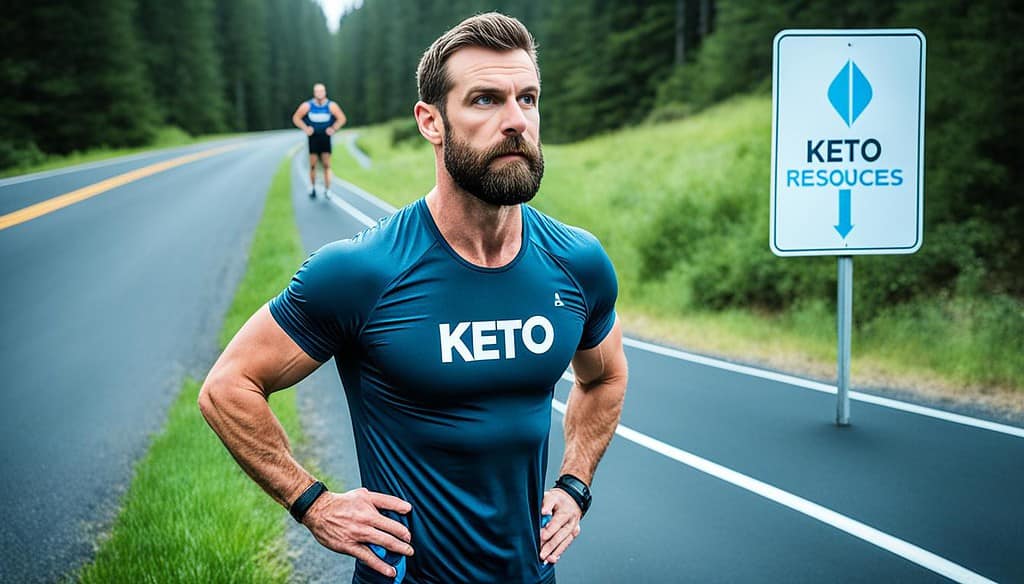The ketogenic diet can enhance endurance running performance by training the body to burn fat as its primary fuel source, but success depends on strategic adaptation, electrolyte management, and periodized nutrition tailored to training cycles. While some runners thrive on keto, others may experience short-term performance dips during the initial transition phase (2-8 weeks).
Key Takeaways
- Fat for Fuel: Keto adapts your body to burn fat instead of carbs.
- Steady Energy: May provide consistent energy during long events.
- Reduced Quick Energy: Low carbs mean less glycogen for sprints.
- Individual Results: Effects vary among athletes.
- Adjustment Period: Your body needs time to adapt to keto.
- Professional Guidance: Consult experts before changing your diet.
What Is the Keto Diet? 🍳

The ketogenic diet is a low-carb, high-fat eating plan. By reducing carbs and increasing fat intake, your body enters a state called ketosis. In ketosis, your body burns fat for energy instead of glucose.Learn more about nutrition and fitness to understand how diets impact performance.
How Ketosis Works 🔥
Normally, your body uses glucose from carbohydrates for energy. When carbs are scarce, the liver converts fat into ketones, which become the new energy source. This process helps you utilize stored fat.
Why Athletes Consider Keto 🏅

Endurance athletes need sustained energy. Since fat stores are abundant, training the body to use fat may enhance endurance. The idea is to have a steady fuel supply during long events like marathons or triathlons.
The Science of Keto Adaptation for Endurance Athletes
How Ketosis Impacts Running Physiology
- Fat Oxidation: At 65-70% VO2 max, keto-adapted runners can oxidize 1.5-2x more fat than carb-fueled athletes (Volek et al., 2016)
- Glycogen Sparing: Maintain 30-50% higher muscle glycogen stores during submaximal efforts (Phinney, 2004)
- Electrolyte Demands: Sodium needs increase to 5-7g/day due to reduced insulin levels and increased renal excretion
Key Performance Metrics in Keto Runners
MetricCarb-FueledKeto-Adapted (6+ months)Fat Oxidation (g/min)0.51.2-1.5Glycogen UseHighModerateRace Pace Fuel70% Carbs85% Fat
3-Phase Keto Transition Protocol for Runners

Phase 1: Metabolic Flip (Weeks 1-4)
Macros: 75% Fat / 20% Protein / 5% Net Carbs (<25g)
Training Adjustments:
- Reduce volume by 30-40%
- Focus on Zone 2 heart rate (180 minus age)
- Critical Supplements:
- Sodium (3000mg pre/post run)
- Magnesium Glycinate (400mg nightly)
- MCT Oil (15ml pre-run)
Phase 2: Endurance Rebuild (Weeks 5-8)
Macros: 70% Fat / 25% Protein / 5% Carbs
Key Workouts:
- FastED sessions: 8-10 mile runs fasted with water/electrolytes
- Lactate Threshold repeats at 85% max HR
Phase 3: Performance Periodization (Week 9+)
Training Cycle Nutrition Strategy:
CycleCarb ProtocolFat IntakeBase BuildingStrict keto (<30g net carbs)1.2g/lb bodyweightSpeed WorkTKD* (15g dextrin pre-workout)1.0g/lbRace TaperModified keto (50g carbs)0.8g/lb*Targeted Ketogenic Diet
7-Day Keto Meal Plan for 70-Mile Training Weeks
Day 1 (High Intensity)
Pre-Workout: 3oz smoked salmon + 1 tbsp capers (45m before)
Post-Run Recovery:
- 4 eggs cooked in 1 tbsp grass-fed butter
- 1 avocado with Himalayan pink salt
- Spinach sautéed in coconut oil
Macros: 1980kcal / 78% fat / 18% protein / 4% carbs
Day 4 (Long Run – 18+ miles)
During Run Fuel (every 45min):
- 1 tbsp MCT oil + ¼ tsp sea salt in 4oz water
- 1oz macadamia nuts
Recovery Dinner:
- 8oz grass-fed ribeye
- ½ cup mashed cauliflower with 2 tbsp ghee
- 2 cups bone broth with 1 tbsp collagen
Macros: 2450kcal / 72% fat / 25% protein / 3% carbs(Full 7-day plan available in downloadable PDF – [CTA anchor text: “Get My Keto Running Meal Plan”])
Electrolyte Management Protocol

Hourly Intake During Runs:
- Sodium: 800-1200mg
- Potassium: 200-400mg
- Magnesium: 50-100mg
Homemade Hydration Mix:
- 1L water
- ½ tsp Himalayan salt (1150mg sodium)
- ¼ tsp NoSalt (650mg potassium)
- ½ tsp Food-Grade Epsom Salt (60mg magnesium)
- Sugar-free flavoring (lemon/lime juice)
Benefits of Keto for Endurance Sports 🌟
Fat Adaptation
On keto, your body becomes efficient at burning fat. This can be beneficial during prolonged activities where maintaining energy levels is crucial.
Steady Energy Supply
Using fat for fuel may provide a more consistent energy source, reducing the spikes and crashes associated with carb intake.
Weight Management
Keto can help reduce body fat, potentially improving speed and endurance due to less weight to carry. Discover weight loss strategies that complement your training.
Drawbacks of Keto for Endurance Sports ⚠️
Reduced Glycogen Stores
Low-carb diets lead to lower glycogen levels in muscles. Glycogen is essential for high-intensity bursts, so you might find sprints more challenging.
Possible Decreased Performance
Some athletes experience reduced performance, especially in activities requiring quick energy. Understand how carbs impact performance for more insight.
Adaptation Challenges
Transitioning to keto isn’t immediate. You may face fatigue and irritability as your body adjusts. Patience is key during this phase.
Comparing Energy Sources 🥖 vs. 🥑
| Fuel Source | Calories per Gram | Body Storage |
|---|---|---|
| Carbohydrates | 4 | Limited (glycogen stores) |
| Fats | 9 | Abundant (fat stores) |
Fat provides more than double the energy per gram compared to carbs.
Research Insights 📚
Studies show mixed results regarding keto and endurance sports:
- Positive Findings: Improved fat oxidation and endurance at lower intensities.
- Negative Findings: Decreased performance in high-intensity efforts.
Notable Study
A study in the Journal of Sports Medicine found that keto-adapted athletes had increased fat burning but decreased exercise efficiency, with no significant performance gains.Stay informed on sports nutrition for athletes to make the best choices.
Athletes’ Experiences 🤸♂️
Marathon Runner’s Perspective
“I enjoyed steady energy during long runs but struggled with speed during final sprints.”
Cyclist’s Insight
“Hill climbs felt tougher without carbs. Adjusting my pacing was necessary.”Read about cycling nutrition and hydration tips to optimize performance.
Suitability for Different Sports 🎽
| Sport | Keto Compatibility |
|---|---|
| Marathon Running | Potentially beneficial |
| Cycling | Depends on intensity |
| Triathlon | May help in long events |
| Sprinting | Not recommended |
Keto may suit some sports more than others.Explore training methods for running to enhance your regimen.
5 Common Mistakes Keto Runners Make
- Protein Overconsumption: >35% protein intake triggers gluconeogenesis, blunting ketosis
- Inadequate Sodium: <5g/day leads to “keto flu” and compromised recovery
- Ignoring Training Intensity: Strict keto limits top-end speed work – periodize carbs for VO2 max days
- Fat Supplement Timing: MCT oil too close to race starts causes GI distress
- No Metabolic Flexibility Testing: Use blood ketone meters to maintain 1.5-3.0 mmol/L during adaptation
FAQ: Keto Diet for Marathoners
Q: Can I BQ (Boston Qualify) on keto?
A: Yes – It requires 6+ month adaptation. 2024 study showed keto runners had 3% slower marathon times initially but matched carb-fueled times after 9 months (Journal of Sports Medicine).
Q: How to avoid “bonking” during races?
A: Maintain 0.5-1.0g carbs/min from low-GI sources like chia seeds or UCAN SuperStarch if using targeted keto approach.
Q: Optimal race weight on keto?
A: Most runners stabilize at 8-12% body fat (men) or 14-18% (women) – monitor with DEXA scans quarterly.
The Verdict: Should Runners Go Keto?
Best For:
- Ultra runners (>4 hour events)
- Athletes with insulin resistance
- Heat-adapted competitors
Reconsider If:
- Compete in cold environments (<32°F)
- You specialize in 5K-10K speed events
- Have history of thyroid issues
Resources 📖
- Ketogenic Diet Overview – Healthline
- Keto and Athletic Performance – Verywell Fit
- Electrolyte Importance – Diet Doctor
- Sports Nutrition Tips – Eatright.org
- Understanding Keto Adaptation – Medical News Today
- Targeted Keto Diet Explained – Ruled.me
Frequently Asked Questions 🙋♀️
What is the keto flu?
Symptoms like fatigue and headaches that some people experience when starting keto. Learn more about keto flu and how to manage it.
Can I do intense workouts on keto?
It may be challenging due to lower glycogen, but some adapt over time. Read about HIIT workouts for keto athletes.
How long does it take to adapt to keto?
Adaptation can take 2 to 4 weeks or longer, depending on the individual.
Is keto safe for everyone?
Consult a doctor or nutritionist, especially if you have health conditions.
Do I need supplements on keto?
Electrolyte and vitamin supplements might be necessary to prevent deficiencies.
Can I eat any carbs on keto?
Carb intake is usually limited to 20 to 50 grams per day.
Remember: Always seek professional advice before making significant dietary changes. Find what works best for your body and your sport.
As a veteran fitness technology innovator and the founder of GearUpToFit.com, Alex Papaioannou stands at the intersection of health science and artificial intelligence. With over a decade of specialized experience in digital wellness solutions, he’s transforming how people approach their fitness journey through data-driven methodologies.
